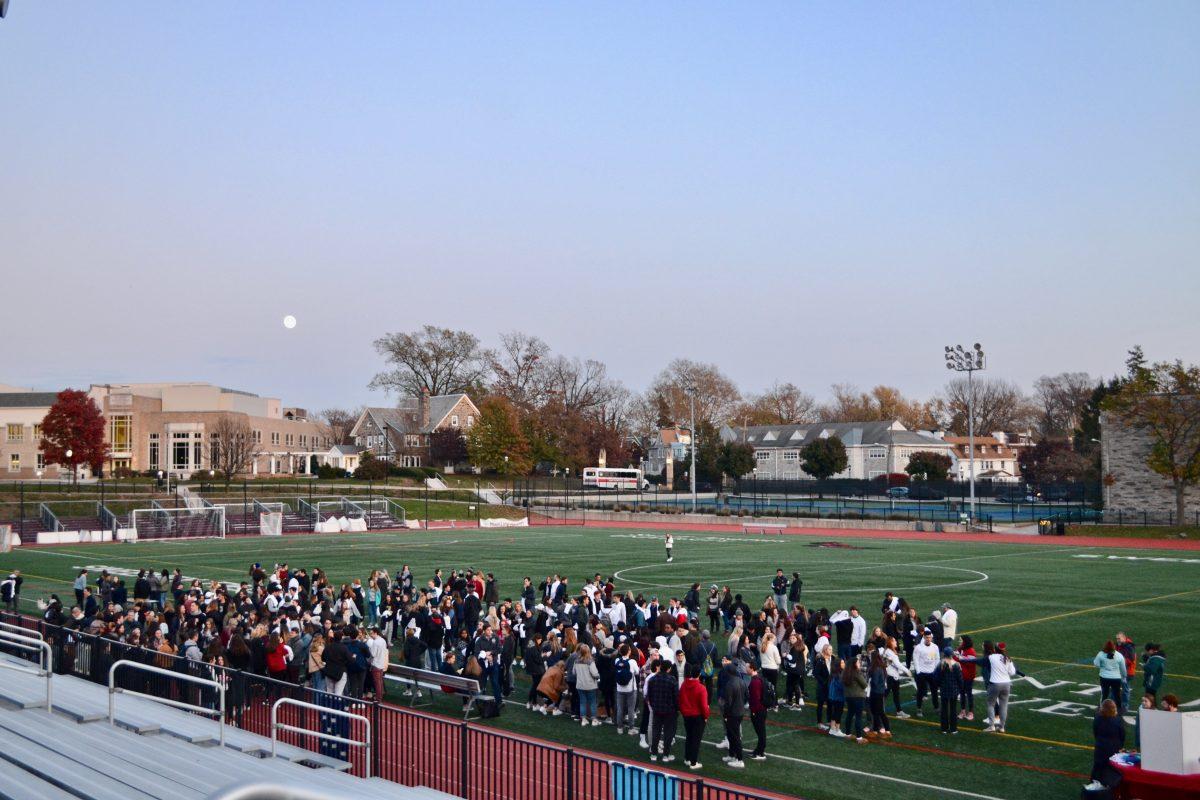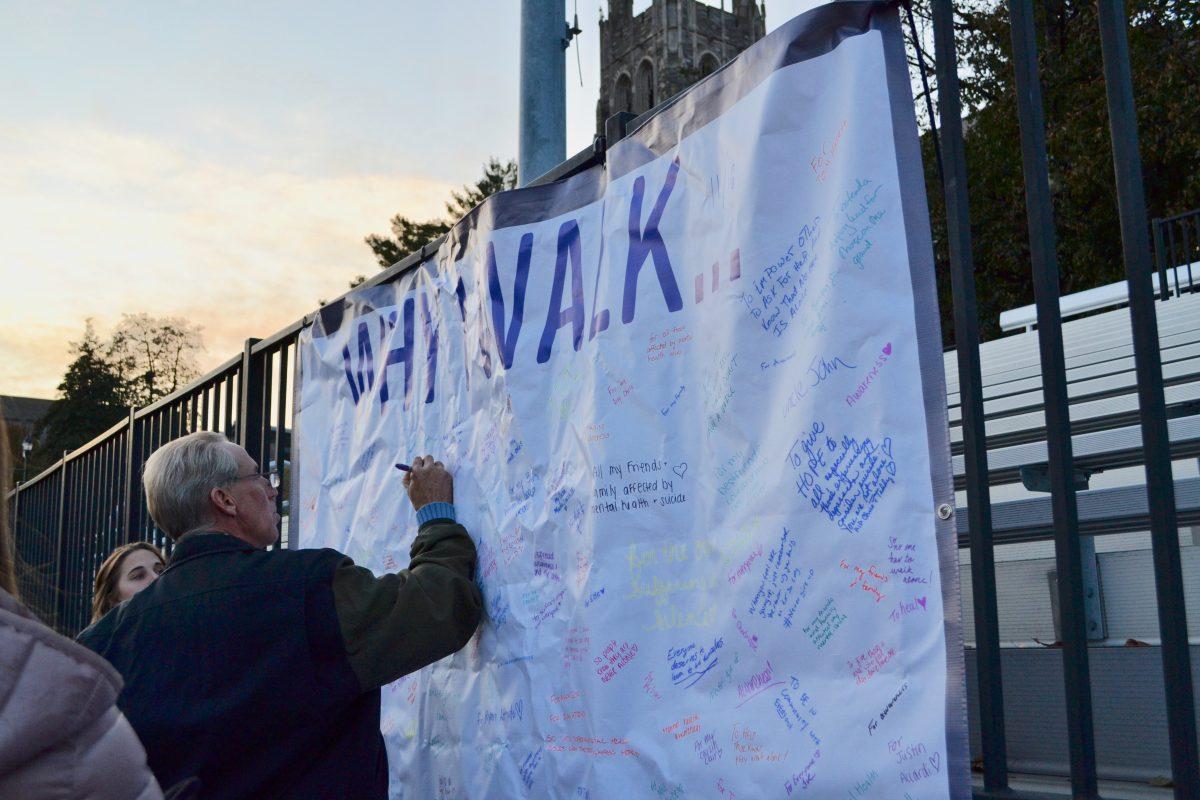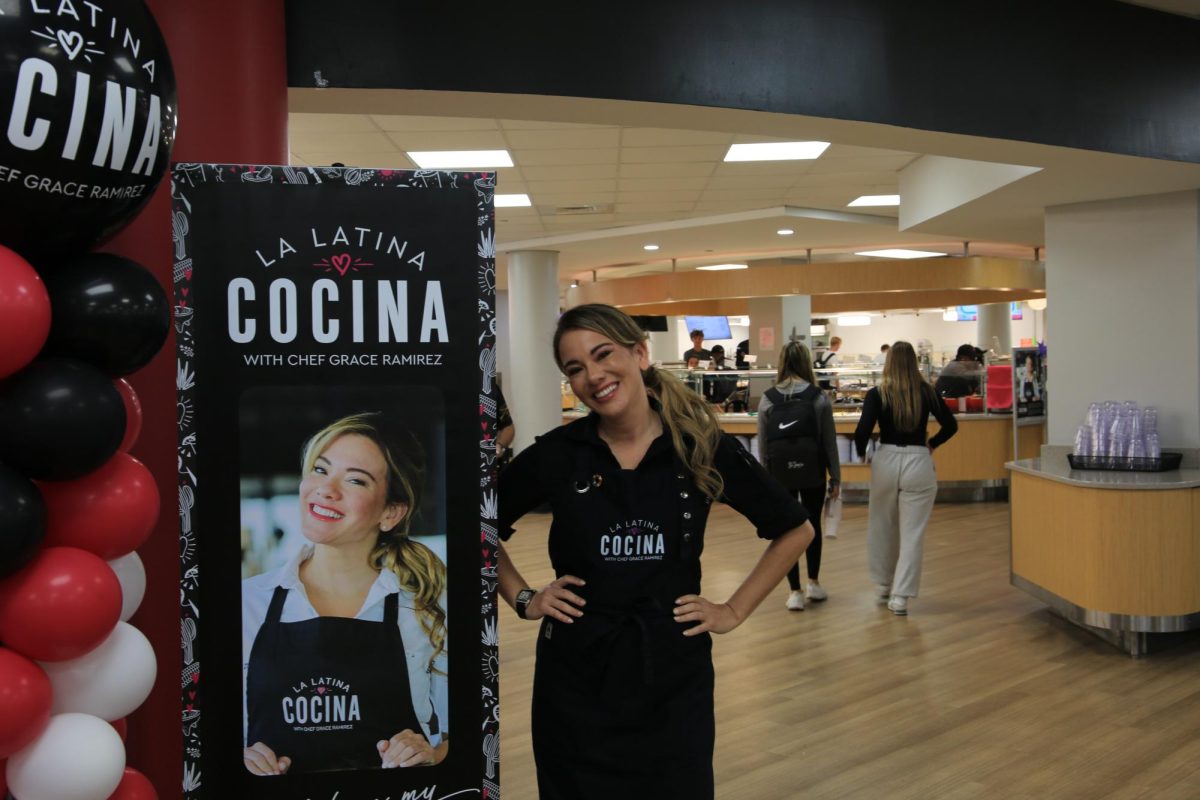Community members gather to talk about mental health
The St. Joe’s community was asked a simple question on Nov. 10: how are you doing? With the light pouring from the lamp posts on Sweeney Field, St. Joe’s was prompted to reflect on their mental health.
At the sixth annual Out Of The Darkness (OOTD) Walk, the St. Joe’s community gathered together to address a topic that tends to be left unaddressed: mental health. The event encourages participants to talk about the mental health of themselves and those around them.
“It reminds people to take a step back and check in with themselves, reflect on their own mental health and also think about those around them and how they think their friends and family members are doing,” said Melissa Crisci ’20, co-dirctor of the walk.
Beginning on Sweeney Field and ending at the Barbelin Hall courtyard, the OOTD Walk made its way through campus to raise awareness about suicide on college campuses.
During the walk, attendees followed a decorated path to the Maguire Wolfington Welcome Center, where there were memorial bags to symbolize friends and/or family members affected by suicide. Along the walk, participants were able to read encouraging messages meant to give them hope to keep going with lights and balloons guiding people.
The event was sponsored by the Dean’s Leadership Program (DLP) and Active Minds. DLP is a co-curricular organization that accepts 35 freshman every year and cultivates their leadership skills throughout their time at St. Joe’s. Active Minds is a national nonprofit organization aiming to raise awareness around mental health and normalize conversations about it. A chapter of the organization was brought to St. Joe’s in 2011 by Marybeth Ayella, Ph.D., assistant professor of sociology, and Natalie Petyk, Psy.D., assistant director of Counseling and Psychological Services (CAPS).
In May of 2014, a senior in DLP died by suicide. In response, members of DLP organized the first OOTD Walk later that year in November.
Vana Zervanos, Ph.D., associate dean of the Erivan K. Haub School of Business and co-director of DLP, believes that it’s during someone’s college and high school years that attention needs to be paid towards mental health as these years are crucial to one’s development.
“This is something that we all have to pay attention to and we as educators, people who are with students all the time and care for students who live among us, these are delicate years for students,” Zervanos said “They’re vulnerable, they’re stressed, they have an immense amount of responsibility.”
Joey Lam ’21, community outreach chair of Active Minds at St. Joe’s, said she feels that mental health is something everyone should be talking about more, especially college students.
“Not everyone has a mental illness, but everyone has mental health,” Lam said. “We want to take care of each other and let our students know it’s okay. This is a campus that accepts who you are for who you are.”
Angela Tonrey ’20, co-director of the walk, said she sees a lot more mental health awareness being spread in society through things such as social media and celebrities. However, she said there can never be enough acknowledgement because there are still people who don’t recognize signs of poor mental health.
“I don’t think people put [mental health] where they should,” Tonrey said. “Physical health normally drives and mental health takes the back seat.”
Suicide was the second leading cause of death among college students in 2017.
Crisci and Tonrey both felt drawn to OOTD because of their own personal experiences with suicide and mental health. In 2018, Crisci lost her cousin, Martin, to suicide. Turning her grief into something positive, Crisci wanted to channel her experience into ways of helping those struggling with their own mental health and that of their family members.
“There was just something in me that was like, ‘I need to help people who are facing the same hardships, issues and difficulties with their mental health just like [Martin] was,” Crisci said. “It just opened my eyes to the prevalence of it and even on our campus, surrounding community and all over.”
During her sophomore year, Tonrey found it difficult to talk about her mental health problems with someone on campus outside of CAPS. As helpful as her sessions with CAPS were, Tonrey felt the doorway of those sessions was where the help stopped.
“I would go there and tell them all my problems, leave feeling great and then I felt like I couldn’t tell my roommates where I was going whenever I went,” Tonrey said.
Tonrey said she didn’t know a lot about mental health in general her first year of college. If someone came to her then and told her there were ways she could help herself, she said, she would have been better off.
“I think your mental health definitely takes a back seat only because there’s just so many other things happening,” Tonrey said. “I think if you can get a handle on it a little bit earlier, I think a lot of people would be helped.”
Zervanos agreed that gaining access to resources earlier helps people get the upper hand on their mental health and be proactive rather than reactive.
“It’s not something that’s going away and it’s something that remains stigmatized,” Zervanos said. “Whether it’s suicidal ideation or depression, anxiety and mental health issues in general, I think young people are shy and afraid to talk about them.”
However, that there is still a social stigma undermining conversations about mental health in everyday life. Something people like Zervanos want to see is the normalization and socialization of mental health in everyday conversation.
“That takes the stigma down,” Zervanos said. “The more [mental health is] out there, the more it can bring down the stigma like okay this is like a broken leg, this is like a flu shot, this is like antibiotics.”
Gianna Gesualdo ’20, president of DLP, said she believes the community aspect of the walk has an amazing ripple effect on everyone who attends. To her, this sense of community is enough to bring someone out of the darkness.

“What really hits home about an event like this is this is something where we see people come by themselves, which is huge,” Gesualdo said. “People show up to this walk by themselves and get a greater sense of community.”
At the end of the day, Zervanos understands that the struggle someone has with mental health is never easy and never will be.
To her, something people can do is simply take care of one another and realize we are all in one community.
“It’s tough, but there’s hope and we need to lean on each other when that hope doesn’t seem possible or it seems to fade,” Zervanos said. “Applaud people’s bravery and courage for confronting things that are hard and difficult and telling their stories, which the answer is not always clear.”
If you or someone you know may be at risk of suicide, call CAPS (610-660-1090), Student Outreach and Support (610-660-1149) or the National Suicide Prevention Lifeline (1-800-273-8255).















































